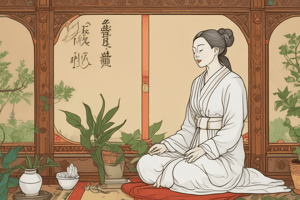Podcast
Questions and Answers
What does the World Health Organization define traditional medicine as?
What does the World Health Organization define traditional medicine as?
The sum total of the knowledge, skills, and practices based on the theories, beliefs, and experiences indigenous to different cultures, used in the maintenance of health and in the prevention, diagnosis, improvement, or treatment of physical and mental illness.
What are some components included in traditional medicine?
What are some components included in traditional medicine?
Use of plants and herbs, animals, fungi, minerals, rocks, and faith practices.
All cultures have unique forms of traditional medicine prior to orthodox medicine.
All cultures have unique forms of traditional medicine prior to orthodox medicine.
True (A)
What is the main concept of Chinese Traditional Medicine (TCM)?
What is the main concept of Chinese Traditional Medicine (TCM)?
Which of the following is not a treatment method of TCM?
Which of the following is not a treatment method of TCM?
What is acupuncture?
What is acupuncture?
What is the aim of moxibustion?
What is the aim of moxibustion?
What is alternative medicine?
What is alternative medicine?
Study Notes
Introduction to Traditional and Alternative Medicine
- Traditional and alternative medicine practices existed before the introduction of orthodox medicine.
- These practices are still prevalent despite the emergence of modern medicine.
Definitions
- Traditional medicine is the sum of knowledge, skills, and practices based on indigenous cultural beliefs and experiences.
- It encompasses approaches to health maintenance, prevention, diagnosis, and treatment of physical and mental ailments.
- The term "traditional" emphasizes its historical origins and transmission through generations, often passed down orally or in written form.
Traditional Medicine
- Utilizes various natural elements including plants, herbs, animals, fungi, and minerals.
- Incorporates faith practices as well.
- Herbal medicine is the most popular and profitable form of traditional medicine.
Alternative Medicine
- Refers to medical treatments or practices not part of a country's conventional medicine or fully integrated into the dominant healthcare system.
Origins of Traditional and Alternative Medicine
- All cultures have unique forms of traditional medicine.
- Examples include: Chinese, Indian, European, Japanese, and African traditional medicine.
Chinese Traditional Medicine (TCM)
- Developed over 5,000 years ago.
- Based on the concept of Qi (chi), a vital life force that flows through the body.
- TCM aims to restore Qi balance through personalized treatments.
- Practices include: Acupuncture, Acupressure, Moxibustion, and Herbal medicine.
Acupuncture
- Involves inserting thin needles into specific points on the skin.
- Based on the belief that illness arises from blockages or disruptions in Qi flow.
- Aims to restore Qi flow, calm the mind and nervous system, and improve circulation.
- Commonly used for conditions like allergies, chronic pain, hypertension, stroke, and stress relief.
Moxibustion
- A heat therapy using the dried leaves of the mugwort plant, known as moxa.
- Involves burning moxa near the skin surface.
- Intended to stimulate Qi flow and detoxify the body.
Studying That Suits You
Use AI to generate personalized quizzes and flashcards to suit your learning preferences.
Related Documents
Description
Explore the foundational concepts of traditional and alternative medicine, their historical significance, and the practices involved. This quiz covers definitions, various natural elements used in traditional medicine, and the role of alternative treatments in contemporary health care.




